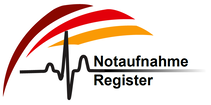Digital Emergency Medicine
Zentrum für Notfall- und RettungsmedizinThe Digital Emergency Medicine group is part of the University Emergency Department in Freiburg. Our group seeks a deep data-driven understanding of the processes leading to a high quality of emergency care. With a system-wide approach to harvest data from various electronic health records (EHR) from within and from outside the University Medical Center we facilitate a profound understanding of health care quality.
Several projects converge the temporal and spacial distribution of quality and performance indicators to a comprehensive set of clinical emergency medicine data to deliver the best possible acute care to every single patient presenting in our ED:

The University Emergency Department Freiburg is funded by the German National Research Network of university medicine (Nationales Forschungsnetzwerk der Universitätsmedizin - NUM) and the Federal Ministry of Education and Research (BMBF) to participate in the AKTIN (Aktionsbündnis für Informations- und Kommunikationstechnologie in Intensiv- und Notfallmedizin) project, a nation-wide registry for emergency medicine in Germany.
The aim of the AKTIN project is to develop a uniform, standardized and interdisciplinary clinical documentation for all emergency department patients in Germany. Electronic health records (EHR) represent the foundation for establishing a national emergency department register. The standardized documentation and the transformation into a semantic interoperable data set enables us to perform cross-clinic evaluations, health-care research and quality improvement by benchmarking. The AKTIN emergency department register is a modern tool for the quality management optimization in emergency departments and for the fundamental improvement of health-care research in the acute medicine in Germany.
The registry data is also used to feed the Emergency Department Surveillance Dashboard by the Robert Koch Institute (RKI).
The AKTIN-project is funded with EUR EUR 111.200,00 by the federal ministry of education and research (BMBF). Please contact Dr. Felix P. Hans or Jan Kleinekort for further information.

Digitalized health data have immense potential to transform health care systems to become more personalized, sustainable and preventive. The game changer for all health care industries in this transformation process will be accessible data in combination with artificial intelligence (AI). Data science and AI provide powerful computing technologies that can extract heterogenous and nonobvious associations and discriminations from complex data sets. AI and data science are predetermined to play a central role in health care due to the advances in computer power, learning algorithms and collection of big data from various sources. Accordingly, longitudinal patient records containing information on patient’s demographics, health, diagnoses, treatments and outcomes, among others, represent a valuable treasure trove of information.
Recent events have proven again that medical mass casualty or mass diseased situations can evolve within days, hours or just seconds. The nature of these events usually is described as an emergence of
patients that exceeds the capacity of the local health care infrastructure. The need of ambulances and EMS (Emergency Medical Services)-personnel at a scene usually is coordinated by local dispatch
centers. But also hospitals are in the need of adjusting the patient flow to prevent ED (Emergency Department)-crowding. First systems in Germany exist and have been stand-up-improved during the recent COVID-19 pandemic. Yet, it has become dramatically obvious that the lack of inter-county, inter-state and international interoperability of those systems can cost human lives in a days’ time. Language barriers as well as synchronization of technical infrastructure and well-known chains of command are crucial parameters of static and dynamic friction between different health care systems. Especially the European continent with high closeness of small states and multiple transnational regional conurbations is in the need of systems that integrate data on cross-border availability of hospital infrastructure as well as clinical parameters for the prediction of patient emergence and clinical deterioration.
The CLINNOVA-project aims to bring together crucial players of the cross-border health care landscape in Baden-Württemberg, Grand Est and Luxembourg. The University Medical Centers in Baden-Württemberg have provided support in the recent COVID-19 pandemic to the health care system in the French neighbor departments by transfers of patients into the respective German hospitals. Unfortunately, it showed that there is no low-threshold access to cross-border transferrals. Only by lengthy negotiations by state officials individual patient transfers could be organized. Given the massive surge of critically ill patients in the area at the beginning of the COVID-19 crisis while German emergency departments and ICU-facilities had been already emptied the enforced idleness was unbearable for all parties.
CLINNOVA’s capacity building creates and consolidates a shared data-enabling dimension between partners in the Grande Région as a central European model region. Cross border data interoperability in a clearly defined region is a key asset and a blueprint for future health care in Europe. CLINNOVA involves translational research institutions and platforms e.g. biobanks, hospitals and other health care providers. It will be designed to integrate cross-border activities, enabling the effective and secure management and analysis of patient data across partner institutions. This mandates the creation of a federated data
environment with remote analysis capabilities.
The CLINNOVA project is funded with EUR 644.150,00 by the ministry of science, research and art Baden-Württemberg. Please contact Dr. Felix P. Hans for further information
Cockpit
Timeliness is among the six dimensions of health care quality (institute of medicine - IOM) and notably important in the treatment of acutely ill or injures patients. The COCKPIT-project extracts performance indicators from our EHR and waiting management system to compile a central dash board. Here we analyse important quality operators like the door-to-triage-times and the urgency of all patients. Subqueries can identify bottlenecks in the triage process, queue lengths and the administrative tasks and therefore facilitate us to add valuable information to the rostering, staffing and process optimization.

The COCKPIT aims to identify all relevant process times of the whole patient journey in our ED and helps us understand how to improve both patient and staff satisfaction.
Please contact Dr. Felix P. Hans or Dr. Michael Röttger fur further information
The German medical informatics initiative (MII) aims to promote the use of health data in the development of new bodies of knowledge across the national health care system. To engage patients in the process, explain the risks and benefits and to create the legal foundation for the use of the patient's data, the MII has developed a uniform process of informed consent. This so-called 'broad consent' enables scientists to use the patient's routine data, biomaterials, and metrics of the statutory health system in a retrospective and prospective manner (MII-flyer, PDF download).
As emergency departments often act as the first point of contact in the patient journey, the implementation of a broad consent-system at this point is crucial for recruitment. Therreby we are able to avoid selection biases and to identify eligible patients for the inclusion in studies, surveys, and register studies.
CODEX + helps us to gain first insights in how broad consent can be implemented in the environment of EDs in Germany. We are especially interested in the acquisition of performance indicators such as inclusion rates, required resources and consent-influencing factors. Hence, we will be able to generate valuable procedural knowledge that can act as blueprints for the use of broad consent tools is other elements of the German health care system.
The CODEX-project is funded with EUR 49.500,00 by the Federal Ministry of Education and Research (BMBF). Please contact Dr. Felix P. Hans for further information.
The COMPETENCE project (Comprehensive Trans-Sectoral Emergency Care) aims to fully understand the nexus of health care quality in emergency medicine. Especially the impact of the sectoral division of the German health system on the care of emergency patients poses a core interest of our group.
The COMPETENCE project is funded by the German federal joint committee with EUR 75.000,00.
Please contact Dr. Felix P. Hans or Dr. Leo Benning for further information
The MAGNET 4 Europe project goes where others look away. Embedded in the pan-european project https://www.magnet4europe.eu we assess work place violence against health care workers in the emegency department. By doing so we aim to support the claim for a safe work place environment, investigate the phenomenon further and eventually improve the local protocols for de-escalation and HCW protection.
The MAGNET 4 Europe project unfortunately is not funded.
Please contact Dr. Felix P. Hans for further information
PROOFED
The majority of our emergency department´s patients arrive by emergency medical services (EMS). Although most EMS use digital measures of documentation, for the most part this information is not available to the hospital in a machine-readable way after the arrival of the patient. By the 'comprehensive integration of emergency data' (PROOFED -project) we aim to complete the patient`s digital chain of survival. As we integrate the medical and operational details of each EMS mission in a semantic interoperable manner, we are able to gain insights in crucial parts of the pre-clinical dispatch and treatment. Thus, we can allocate necessary resources within the emergency department, identify possible shortcomings and thereby further improve the health care quality of our patients.
The PROOFED-project is funded with EUR 384.128,00 by the federal ministry of health. Please contact Dr. Felix P. Hans or Jan Kleinekort for further information.
Gefördert durch Mittel des Krankenhauszukunftsfonds beim Bundesamt für Soziale Sicherung und des Landes Baden-Württemberg
|
Benning, L., Köhne, N., Busch, HJ. et al. Provider perception of presentations with nonspecific back pain in the emergency department and primary care practices: a semi-structured interview study. Int J Emerg Med 17, 121 (2024). doi.org/10.1186/s12245-024-00694-2 |
|
Hans, F., Benning, L., Pooth, JS. et al. A potentially lifesaving error: unintentional high-dose adrenaline administration in anaphylaxis-induced cardiac arrest; a case report. Int J Emerg Med 17, 78 (2024). doi.org/10.1186/s12245-024-00663-9 |
|
Benning, L., Hans, F.P., Busch, H.J. Notfallmedizinisch relevante Komplikationen der Leberzirrhose. Notfallmedizin up2date 2024; 19(02): 189-210. doi.org/10.1055/a-2180-6636 |
|
Madrid J, Diehl P, Selig M, Rolauffs B, Hans FP, Busch HJ, Scheef T, Benning L. Assessing the Performance of Plugin-Integrated ChatGPT-4 in the German Medical Board Examination: An Experimental Study on the Advancements and Limitations of Modern AI Modelling Approaches. MIR Preprints. 14/03/2024:58375. doi.org/10.2196/preprints.58375 |
|
Hans, F.P., Krehl, J., Kühn, M. et al. Übergabe und Übergabeschemata in der Notaufnahme. Med Klin Intensivmed Notfmed 119, 71–81 (2024). doi.org/10.1007/s00063-023-01079-8 |
|
Benning, L., Giesler S., Krehl, J. et al. Hämatologische und onkologische Notfälle. Notfallmedizin up2date 2023; 18(04): 395-418. doi.org/10.1055/a-1980-0164 |
|
Eder, P.A., Soda, H., Kumle, B. et al. Digitales Notfallmanagement im Netzwerk der Akut- und Notfallversorgung. Eckpunktepapier des Expertenrats des ZTM. Notfall Rettungsmed (2023). doi.org/10.1007/s10049-023-01241-x |
|
Benning L, Kleinekort J, Röttger MC, Köhne N, Wehrle J, Blum M, Busch H-J and Hans FP (2023) Factors influencing the occurrence of ambulatory care sensitive conditions in the emergency department - a single-center cross-sectional study. Front. Med. 10:1256447. doi.org/10.3389/fmed.2023.1256447 |
|
Klingenberg, M.; Elsner, A.; Pooth, J.-S.; Hans, F.P.; Benning, L. The Effect of Therapeutic Adherence on the Effectiveness of a Digital Therapeutic Exercise Program: A Propensity Score Matching Analysis. Healthcare 2023, 11, 2614. doi.org/10.3390/healthcare1119261 |
|
F.P. Hans, F. Lerch, M. Sandrock, O. Barth, N. Zink, H. Schmidtpott, T. Wiucha, K. Dietzig und L. Benning.Reanimationsmaßnahmen während Helikopter-Windenrettung – Erfolgskriterien und Verbesserungspotenziale für transorganisationale Rettung. 2023; 48: 114-123. doi.org/10.5414/IBX00614 |
|
Benning, L., Krehl J., Hans F.P. Diabetes mellitus in der Akut- und Notfallmedizin. Notfallmedizin up2date 2023; 18(01): 45-62. doi.org/10.1055/a-1893-2251 |
|
Teepe GW, Kowatsch T, Hans FP, Benning L. Postmarketing Follow-Up of a Digital Home Exercise Program for Back, Hip, and Knee Pain: Retrospective Observational Study With a Time-Series and Matched-Pair Analysis. J Med Internet Res 2023;25:e43775. doi.org/10.2196/43775 |
|
Teepe GW, Kowatsch T, Hans FP, Benning L. Preliminary Use and Outcome Data of a Digital Home Exercise Program for Back, Hip, and Knee Pain: Retrospective Observational Study With a Time Series and Matched Analysis. JMIR Mhealth Uhealth 2022;10(12):e38649. doi.org/10.2196/38649 |
|
Slagman, A., Pigorsch, M., Greiner, F. et al. Medical and cardio-vascular emergency department visits during the COVID-19 pandemic in 2020: is there a collateral damage? A retrospective routine data analysis. Clin Res Cardiol 111, 1174–1182 (2022). doi.org/10.1007/s00392-022-02074-3 |
|
Schmid, B., Lang, C., Danner T. et al. Was macht eine Notaufnahme schlagkräftig gegenüber einer Pandemie? Dtsch Med Wochenschr 2021; 146(10): 657-666. doi.org/10.1055/a-1226-8701 |
|
Rieg S, von Cube M, Kalbhenn J, Utzolino S, Pernice K, Bechet L, et al. (2020) COVID-19 in-hospital mortality and mode of death in a dynamic and non-restricted tertiary care model in Germany. PLoS ONE 15(11): e0242127. doi.org/10.1371/journal.pone.0242127 |
|
Slagman A, Behringer W, Greiner F, Klein M, Weismann D, Erdmann B, Pigorsch M, Möckel M: Medical emergencies during the COVID-19 pandemic—an analysis of emergency department data in Germany. Dtsch Arztebl Int 2020; 117: 545–52. doi.org/10.3238/arztebl.2020.0545 |
|
Hans, F.P., Busch, HJ. Der Diabetespatient in der Notfallversorgung. Notfall Rettungsmed 21, 519–533 (2018). doi.org/10.1007/s10049-018-0497-5 |
|
Hans, F.P., Hoeren, C.J.M., Kellmeyer, P. et al. Possibly preventable cardiac arrest in a morbidly obese patient - a comment on the 2015 ERC guidelines. Scand J Trauma Resusc Emerg Med 24, 116 (2016). doi.org/10.1186/s13049-016-0306-4 |
|
Hans, F.P., Hoeren, C., Schmid, B. et al. Akute Alkoholintoxikation. Notfall Rettungsmed 19, 12–21 (2016). doi.org/10.1007/s10049-015-0116-7 |
The institutional subscriptions by the Albert-Ludwigs-University in Freiburg enable us to access a variety of professional journals and eBooks.
Beyond these resources, the digital emergency medicine group maintains the COMPETENCE library equipped with the finest benchmark works associated with health data science, biostatistics and emergency medicine in general. These books can easily be accessed via our facility’s information specialist.
in alphabetical order

Dr. Leo Benning, MPH
Berta-Ottenstein-Fellow
Physician scientist
leo.benning@uniklinik-freiburg.de

Dr. Laura Bühler
Physician scientist
laura.buehler@uniklinik-freiburg.de

Dr. Felix P. Hans, M.Sc.
Principal investigator
Consultant emergency medicine,
internal medicine & family medicine
felix.hans@uniklinik-freiburg.de

Jan Kleinekort, B.Sc.
Computer scientist, Paramedic
jan.kleinekort@uniklinik-freiburg.de

Nora Köhne
Doctorate candidate

Dr. Matthias Kühn, M.Sc.
Physician scientist, Economist, Paramedic
matthias.kuehn@uniklinik-freiburg.de

Carolin Neufischer
MD Student
carolin.neufischer@uniklinik-freiburg.de

Simon Reimann
Doctorate candidate

Dr. Matthias Roth
Physician scientist
matthias.roth@uniklinik-freiburg.de

Dr. Michael Röttger
Data and software engineer
michael.roettger@uniklinik-freiburg.de
At this time, we do not have any open job positions. However, we are always happy to hear from talented and motivated individuals who may be interested in future opportunities with our group. If you would like to submit your resume and/or cover letter for consideration, please feel free to do so at any time.

We are hiring computer scientists and data crunchers for our ETL pipelines in the data integration center (PostgreSQL, cklickhouse), the implementation of standards and interoperability (FHIR, SNOMED-CT) and the analysis of given datasets (R, Python).
Please contact Felix Hans for further information.
The Digital Emergency Group aims to develop deep system's integrations in our electronic records. We therefore constantly work with our industry partners to connect patient-related data from medical devices with the electronic documentations systems. Thus, we could semi-automatize ventilation data documentation both for business intelligence and for medical usage. In addition, we developed a fluid-management documentation system to achieve a real-time documentation of administered medication to the split second.
Our latest development will be a semi-automatized decision support system for our triage. For the first time we will be computing the urgency of the patient's presentation not only according to the standardized complaints (CEDIS) but also in dependence of age, vital signs and additional risk factors. This Triage-Client will inherit the process times of a preceding patient guidance system we developed. Therefore, we are able to perform a profound process mining to identify possible bottlenecks during the waiting and triage process and guarantee the timeliness as crucial part of the six dimensions of health care quality.
Kontakt
Get connected with us! Our office will happily assist you in any matter.
Zentrum für Notfall- und Rettungsmedizin
Sir-Hans-A.-Krebs-Straße
79106 Freiburg

Dr. Felix P. Hans, M.Sc.
Consultant emergency medicine,
internal medicine & family medicine
felix.hans@uniklinik-freiburg.de

